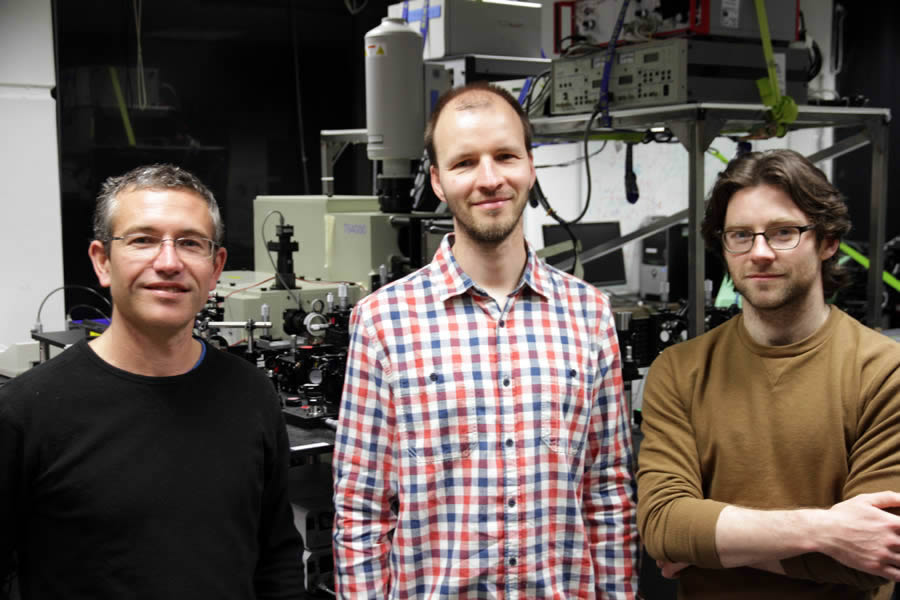KiwiNet News 6 October 2016
CloudSpec innovator receives $25,000 boost from KiwiNet Emerging Innovator Programme for new spectroscopy instrument
Hamilton, 6 October 2016
KiwiNet Emerging Innovator Programme to assess the impact of CloudSpec, a new technology that has the potential to change the way industry analyses ‘cloudy’ solutions. The grant from the KiwiNet Emerging Innovator Programme is awarded to help early career scientists develop clever new ideas and work closely with business to take it to market. This is third of ten grants made possible by a donation from the Norman Barry Foundation.

The CloudSpec team at the Raman Lab at the School of Chemical and Physical Sciences in Victoria University of Wellington. Professor Eric Le Ru (left) with Brendan Darby (right) and Matthias Meyer (centre).
Darby and the team at the Raman Lab at the School of Chemical and Physical Sciences in Victoria University of Wellington are experts in spectroscopy - a technique used to identify the chemicals that make up a substance. Together they are developing CloudSpec, a next generation spectroscopy instrument that allows cloudy or opaque liquids to be analysed quickly and efficiently. Cloudy liquids typically require multiple steps to analyse via traditional spectroscopy techniques. CloudSpec promises a transformational impact in substance analysis by significantly simplifying the process.
CloudSpec has potential applications in a wide range of industries including quality assurance for food, beverage, and water, plus enhancement of forensics testing.
Conventional absorption spectroscopy works by shining a spectrum of light through the sample and monitoring which colours get transmitted, and which are absorbed. This traditional spectroscopy technique becomes ineffective when a sample solution is cloudy or opaque and contains large particulates that scatter light in all directions. This makes it very difficult to discern the absorption spectrum and little information can be extracted about the sample.
Darby says, “At the core of CloudSpec is a new hardware configuration and novel processing techniques which are being designed to be impervious to light scattering. Our new instrument enables cloudy or turbid solutions such as milk, paint, blood, wastewater and algal suspensions, to produce equivalent results to traditional analysis methods without the need for time consuming processing of samples.
“Consequently, we can reduce the number of expensive instruments, processing steps and preparation time required to analyse products. In the food and beverage industry current processes can degrade the integrity of the product whereas CloudSpec won’t compromise it.”
Originally from Ireland, Darby completed his PhD in Surface Enhanced Raman Spectroscopy through the MacDiarmid Institute for Advanced Materials and Nanotechnology supervised by Raman Lab leader, Professor Eric Le Ru, earlier this year.
Darby says, “Professor Le Ru’s infectious passion for science created a fantastic environment for discovery and it was in his lab that the idea for CloudSpec was born. KiwiNet is now enabling us to take the technology from the lab to industry by providing the KiwiNet Emerging Innovator Programmeing, expertise and networks.”
Professor Le Ru says, “The support from KiwiNet is also fostering Brendan’s entrepreneurial skills in the commercialisation space as a young scientist. He’s very excited by the prospect of beginning his career in science playing a key role in developing a potentially game changing product.”
The KiwiNet Emerging Innovator Programme, established thanks to the generous support of the Norman Barry Foundation, is available to early career researchers based at universities and public research organisations across New Zealand who demonstrate a clever new idea and a willingness to work closely with industry as they develop a prototype. Recipients also receive expert legal advice from KiwiNet corporate partners, MinterEllisonRuddWatts and IP advice from Baldwins.
In addition to funding, KiwiNet provided Darby with a mentor, Clive Seymour formerly of Bruker Daltonics, who shared his expertise in scientific instrumentation, invaluable industry contacts and significant experience working with multinational companies.
Phil Stucki, Commercial Projects Manager, from KiwiNet observed the transformational impact the KiwiNet Emerging Innovator programme had for Darby. Stucki comments, “Brendan’s passion for science is now matched with a tremendous enthusiasm for the business-side of taking research to market. Winning the fund and its associated suite of benefits, has given him a significant understanding of the commercialisation process. He now brings a whole new skill set to his science team.”
Darby’s business acumen has been displayed in subsequent pitches of CloudSpec to the KiwiNet Investment Committee which have secured him an additional $188,000 of PreSeed Accelerator investment to help transform CloudSpec’s cutting edge science into commercial reality.
For further information please contact:
Sandra Lukey
Shine Group (PR for KiwiNet)
Cell: +64 21 2262 858
Email: sandra@shinegroup.co.nz
About KiwiNet Emerging Innovator Programme
The KiwiNet Emerging Innovator Programme was established in 2015 by KiwiNet with the generous philanthropic support of the Norman Barry Foundation. The aim of the Emerging Innovator Fund is to have more scientists with disruptive new ideas working alongside businesses to solve industry challenges. It is open to scientists from public research organisation who demonstrate a clever new idea and a willingness to work closely with industry as they develop a prototype. The KiwiNet Emerging Innovator Programme is available to early career researchers based at universities and public research organisations across New Zealand.
About the Norman Barry Foundation
The Norman Barry Foundation, is a charitable trust registered under the Charities Act 2005. Norman Barry was an entrepreneur and a philanthropist who established the Quality Hotel Parnell. During his successful business career he mentored motel owners in Auckland who were new to the industry and helped various charitable organisations in the form of donations. Norman left his shareholding in Quality Hotel Parnell Limited to the Foundation, and the distributions from this Company to the Foundation are used for charitable donations. In addition, Quality Hotel Parnell Limited is also a registered charity in its own right and this company also makes donations to the community.
